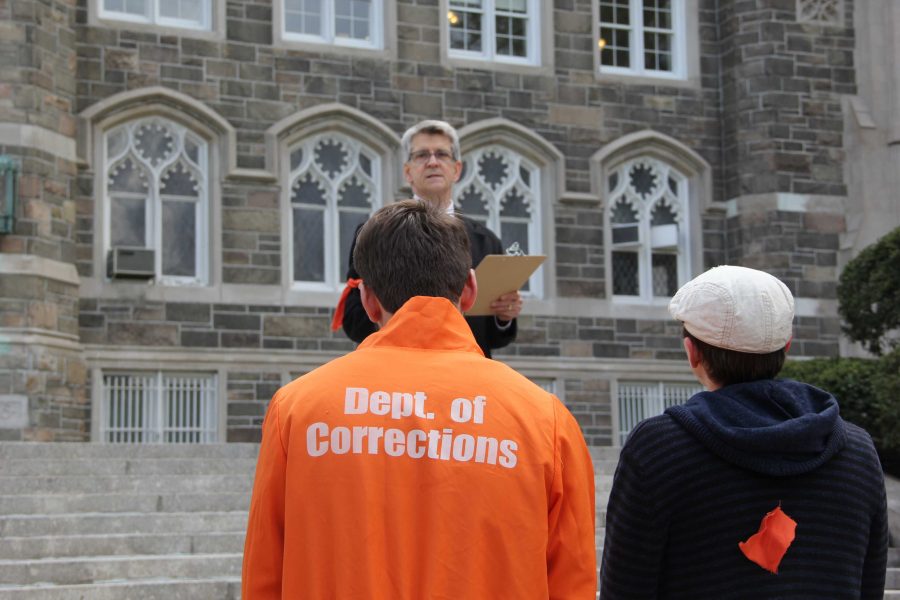By Rob Palazzolo
The group slowly made its way through the light rainfall, proceeding around Eddie’s and past the fountain to the wide front doors of the office of Rev. Joseph M. McShane, president of the university, in Cunniffe House. Some were linked arm-in-arm. Some wore orange jumpsuits — an homage to the grim photos of Guantanamo Bay detainees that have been seared into the national consciousness for years.
They arrived at the front door. Four members of the group Fordham Against Torture looked around at the roughly thirty strong marchers for the go-ahead. Then, they walked in through the door and hand-delivered a manila envelope containing a petition bearing the signatures of 722 members of the Fordham community.
The petition, delivered to McShane’s office on Thursday, April 23, bore a simple message: revoke the honorary degree granted to John Brennan, FCRH ’77 and current director of the Central Intelligence Agency.
Of the conferral of an honorary degree to Brennan, the petition said: “In light of the recently released Senate Intelligence Committee Report on CIA Torture, it is now indefensible. Mr. Brennan is complicit with the war crimes and human rights abuses documented by the Senate.”
Brennan was the commencement speaker in 2012, and received an honorary doctorate in humane letters. However, the choice was immediately controversial because Brennan worked at the top level of the CIA during the implementation of its so-called “Enhanced Interrogation Techniques.” The techniques were condemned by a Senate Intelligence Committee report from 2014 and are widely considered to constitute torture.
Brennan has publicly defended the CIA torture program many times in his current role as CIA director, which he has held since 2013.
Theology professor Dr. Jeannine Hill Fletcher, one of the leaders of Fordham Against Torture present at the petition delivery, said that Brennan’s public defense of torture runs counter to Fordham values.
“An honorary degree confers our highest honor on people who we think are doing the work that Fordham nurtures. And there’s the sense, among many of us, that Fordham has nurtured somebody who is condoning torture both when our Catholic tradition and the wider international community have said flat-out that torture is…unacceptable,” said Fletcher.
Phil Feibusch, FCRH ’17, was one of the orange-clad protestors in the group. He said that he was not aware of the John Brennan controversy initially, but once he learned of it, the choice seemed obvious.
“I personally am anti-torture. I think most people are anti-torture,” said Feibusch,
“It’s really embarrassing to go to a university that’s publicly honoring someone who’s publicly pro-torture. Especially as a Jesuit university.”
Jim Robinson, a first year theology graduate student who was also among the group that delivered the petition, agreed, saying that Brennan’s support of the CIA program should be considered unacceptable to a Jesuit university.
“An honorary degree is emblematic of a blessing of ideas. And I think that — our approach is that we would not want to bless these ideas,” argued Robinson.
However, Robinson was quick to point out that the larger goal of Fordham Against Torture is to make students think more broadly about what their university — and country — is doing in their name.
“This is not an anti-John Brennan movement. This whole issue is about human dignity. We’re not in any way trying to call into question his dignity as a human being,” said Robinson.
“This is a movement about ideas,” he added.
Likewise, the leadership of Fordham Against Torture has said that it is looking for a dialogue about the ethics of torture, and for greater discernment of whether recipients of honorary degrees are in accord with Catholic values. Theology professor Dr. Brad Hinze said that the feedback they have received has indicated that the Fordham community wants to have these discussions.
“I’ve been receiving emails from faculty members saying how gratified they were that somebody raised the issue, and that there was this discussion going on,” said Hinze.
There have been concerns over Fordham Against Torture’s ability to rally students around their cause, as The Fordham Ram reported in March. At that point, the petition only had roughly 100 more signatures than one seeking to include commuters into Integrated Learning Communities (an effort that only took the Commuting Students Association one weekend). Hinze acknowledged that that had been a concern, a fact he attributed to today’s college culture, which is very different from the glory days of campus protest — the 1960s and ’70s.
“You’d have to say about Fordham students that they’re really quite alert to social justice issues, globally, nationally and locally. At the same time, there has just not been a practice and a culture of developing mobilization around social, political issues,” said Hinze.
However, Hinze said he was pleased to see the dialogue springing forth from Fordham Against Torture’s efforts, and that he hopes it will continue through next year.
It remains to be seen whether the petition is successful and John Brennan’s honorary degree is revoked. The president’s office did not immediately respond to a request for comment, but Fletcher said she believes their efforts will be worthwhile.
“I would hope that Fordham would find the moral courage to revoke the degree,” Fletcher said. “I think it would make a statement about what our mission actually is. And through the movement of the past few months, I’ve been given more hope than despair that this could actually be possible.”






































































































































































































